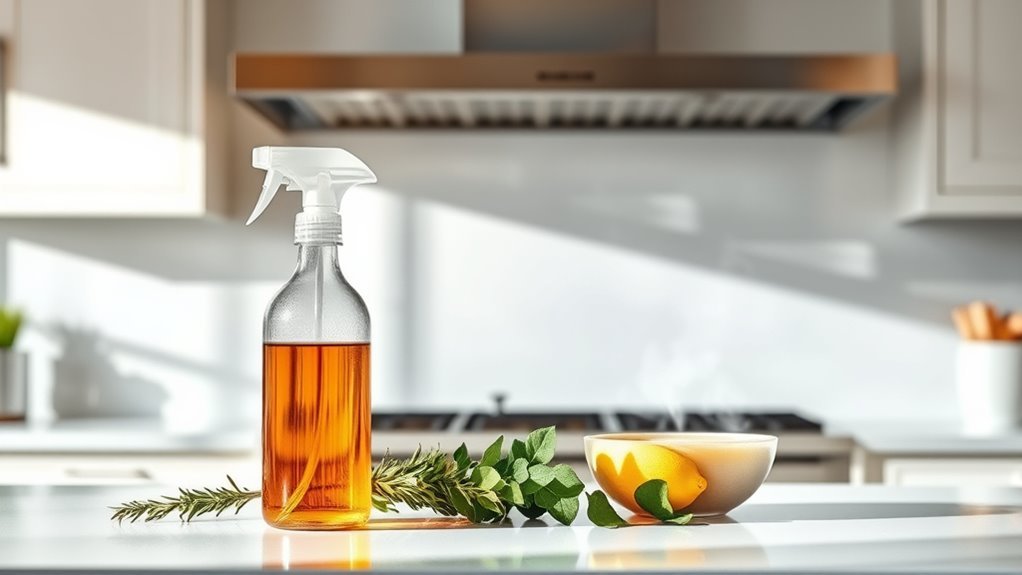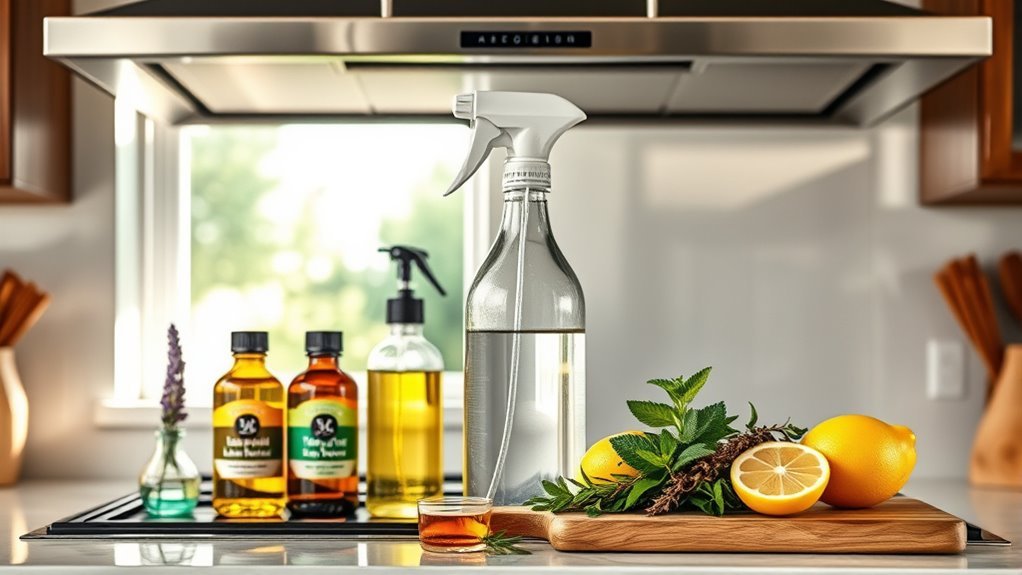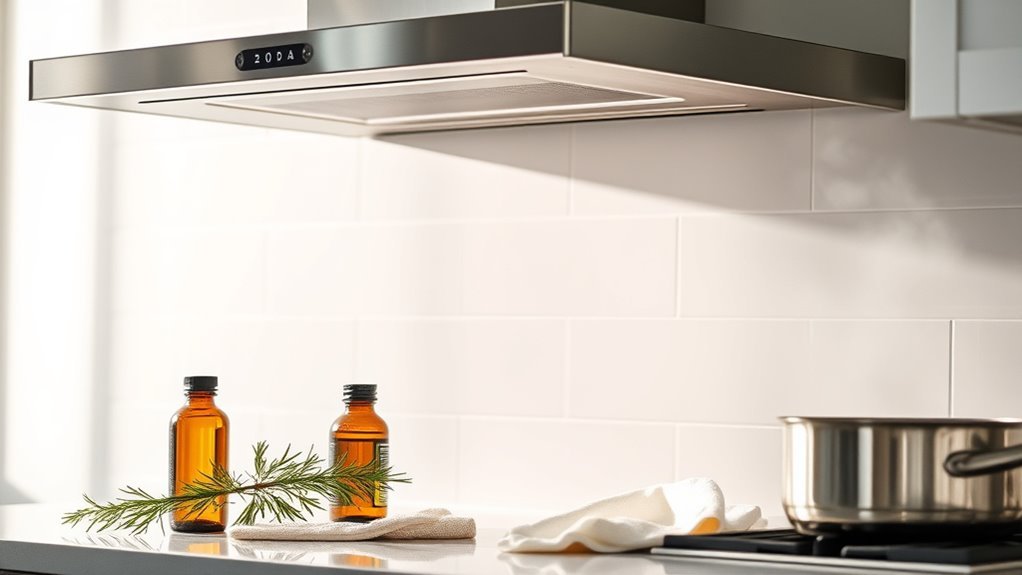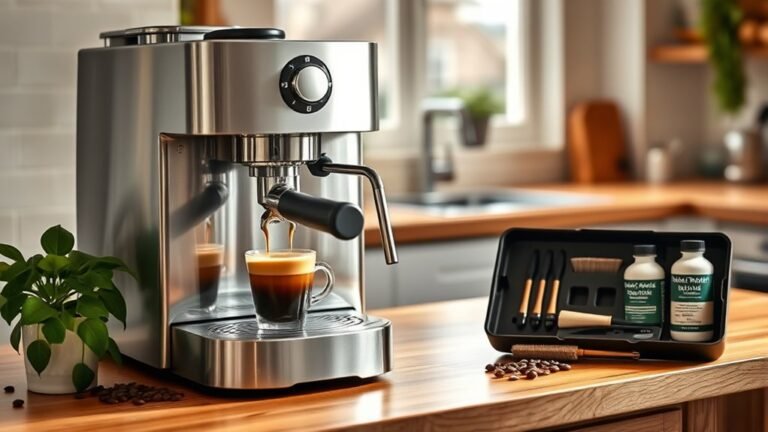Using Essential Oils to Clean Range Hood
You can clean your range hood naturally using essential oils like lemon and lavender, which cut grease and offer antibacterial benefits without harsh chemicals. Mix 15 drops of these oils with white vinegar, water, and castile soap in a spray bottle. Unplug the hood, soak filters in the solution, and wipe surfaces clean for a fresh, toxin-free kitchen. To keep it fresh over time, regular maintenance is key. Discover simple steps to make your cleaning routine easier and more effective.
Benefits of Using Essential Oils for Cleaning

Although there are many conventional cleaning products available, using essential oils for cleaning offers unique benefits that you might not have considered. When you choose essential oils, you’re reducing your environmental impact by avoiding harsh chemicals that can pollute water and air. This choice supports a cleaner, greener lifestyle, giving you freedom from toxic residues in your home. Additionally, essential oils provide notable health benefits; their natural antimicrobial properties help eliminate bacteria without irritating your skin or respiratory system. You also enjoy uplifting aromas that enhance your mood and well-being while you clean. By integrating essential oils into your cleaning routine, you embrace a holistic approach that respects both your health and the planet, empowering you to maintain a fresh, safe range hood environment naturally.
Essential Oils Ideal for Range Hood Maintenance
When maintaining your range hood, choosing the right essential oils can make a significant difference in both cleaning effectiveness and scent. Lavender oil is ideal for its natural antibacterial properties and calming aroma, helping you create a fresh, soothing kitchen environment. Lemon oil stands out for its powerful grease-cutting ability and invigorating citrus fragrance, making it perfect for breaking down stubborn residues while leaving your range hood smelling clean and bright. These oils not only enhance cleanliness but also support a holistic approach to home care, free from harsh chemicals. By selecting lavender oil and lemon oil, you embrace a natural, effective way to maintain your range hood, ensuring it functions well and keeps your kitchen smelling inviting. Always remember to use essential oils with proper dilution to ensure safety and maximize their benefits.
Preparing a Natural Cleaning Solution With Essential Oils

Before you start cleaning your range hood, you’ll want to prepare a natural solution that combines the antibacterial and grease-cutting properties of essential oils with a gentle base like white vinegar or castile soap. This approach guarantees you use eco friendly alternatives that protect both your home and the environment. Here’s a simple blend using natural ingredients:
| Ingredient | Amount |
|---|---|
| White vinegar | 1 cup |
| Water | 1 cup |
| Castile soap | 1 tbsp |
| Essential oil blend | 15 drops |
| Spray bottle | 1 (16 oz) |
Mix these in your spray bottle, shake gently, and your natural cleaning solution is ready to refresh your range hood without harsh chemicals. Using natural cleaning supplies not only promotes a toxin-free kitchen but also supports a cleaner planet.
Step-by-Step Guide to Cleaning Your Range Hood
Since your range hood tackles grease and smoke daily, giving it a thorough cleaning is crucial to maintain its efficiency and appearance. Start by unplugging the unit to guarantee safety. Remove the filters and soak them in warm water mixed with your essential oil cleaning solution to break down grease effectively. While they soak, wipe down the hood’s exterior and interior surfaces using a soft cloth dampened with the same solution, applying gentle cleaning techniques to avoid damage. Rinse and dry the filters completely before reinstalling them. Finally, clean the fan blades carefully, if accessible, and wipe the vent cover. By following these precise steps, you’ll keep your range hood functioning effectively and looking fresh, enjoying a cleaner kitchen environment with minimal effort. Regular maintenance, such as cleaning the filters monthly, helps prevent future grease buildup and keeps your kitchen air fresh by ensuring proper ventilation and optimal air quality.
Tips for Maintaining a Fresh and Clean Range Hood

Keeping your range hood clean doesn’t end with a thorough scrub; regular upkeep is key to preserving its performance and freshness. Establish consistent cleaning schedules to prevent the buildup of oil residues that can hinder your hood’s efficiency and cause unpleasant odors. Wiping down surfaces weekly with a mixture of water and essential oils not only removes grime but also leaves a natural, fresh scent. Don’t forget to clean or replace filters as recommended, since clogged filters trap grease and reduce airflow. Ventilate your kitchen well during and after cooking to minimize airborne grease settling on your hood. By maintaining this disciplined routine, you’ll enjoy a range hood that looks pristine, functions effectively, and supports a healthy, fresh kitchen environment. Using essential oils with antimicrobial properties can further enhance the cleanliness and freshness of your range hood.
Frequently Asked Questions
Can Essential Oils Damage My Range Hood’s Finish?
You might wonder if essential oil types could harm your range hood’s finish. It really depends on the range hood materials—stainless steel, painted metal, or glass all react differently. Some oils, like citrus-based ones, can be acidic and might damage delicate surfaces if used undiluted. To keep your freedom to clean safely, always dilute oils and test on a small, hidden spot first to avoid any unwanted damage.
Are Essential Oils Safe to Use Around Food?
You want to play it safe in your kitchen sanctuary, right? When it comes to food safety, not all essential oil types are created equal. Some, like lemon or tea tree, are generally safe in tiny amounts, but others might not be kitchen-friendly. Always dilute properly and avoid direct contact with food. By choosing wisely and using them sparingly, you can enjoy their benefits without compromising your freedom to cook safely.
How Often Should I Clean My Range Hood With Essential Oils?
You should follow frequency recommendations based on how often you cook, but generally, cleaning your range hood every one to three months works well. Setting a consistent cleaning schedule helps maintain efficiency and prevents grease buildup. If you cook frequently or use greasy foods, clean it more often. Incorporating essential oils into your routine can enhance freshness and provide natural antibacterial benefits, making your cleaning ritual both effective and enjoyable.
Can Essential Oils Remove Grease as Effectively as Commercial Cleaners?
You might think essential oils can’t match commercial cleaners in grease removal, but they actually offer impressive oil effectiveness when used properly. While they may not dissolve heavy buildup instantly, their natural solvents combined with vinegar or baking soda can cut through grease without harsh chemicals. This approach gives you a holistic, eco-friendly clean that respects your space and health, granting you the freedom to maintain your range hood naturally and effectively.
What Should I Do if I Have an Allergic Reaction to an Essential Oil?
If you experience allergic symptoms like redness, itching, or swelling after using an essential oil, stop using it immediately. Wash the affected area with mild soap and water to reduce irritation. To avoid future reactions, consider essential oil alternatives such as vinegar or baking soda for cleaning. Always do a patch test before trying new products, and if symptoms worsen, seek medical advice. Your freedom to choose safe, natural options matters.






